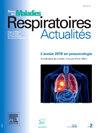肺肿瘤发生:分子基础和治疗意义
Q4 Medicine
引用次数: 0
摘要
非小细胞肺癌是最常见的肺癌类型。其生物学理解目前由两种主要模型构成:多步骤模型,涉及通常与烟草暴露相关的遗传改变的渐进式积累,以及致癌基因成瘾模型,其中肿瘤生长严重依赖于单一遗传驱动因素。基因组学的进步使得能够更精确地识别肿瘤发生和进展的突变,以及影响治疗反应的因素。某些癌前病变可能通过特定的遗传事件、免疫微环境的调节或外部影响(如污染)发展为侵袭性疾病。新出现的证据表明,污染物可以通过炎症途径促进已有肿瘤克隆的出现或激活。癌基因成瘾范式促进了针对特定患者亚群的有效靶向治疗的发展,尽管治疗效果经常受到耐药机制的限制。大规模测序研究进一步揭示了肺肿瘤明显的异质性,其特征是受治疗压力、免疫监视和环境因素影响的复杂克隆进化。这种异质性可能是对靶向药物的内在和获得性耐药性的基础。在精准医学的框架内,这些见解为优化治疗策略提供了基础,并可能为预防和纵向疾病监测的新方法的发展提供信息。本文章由计算机程序翻译,如有差异,请以英文原文为准。
Oncogenèse pulmonaire : fondements moléculaires et implications thérapeutiques
Non-small cell lung cancer represents the most prevalent form of lung cancer. Its biological understanding is currently framed by two principal models: the multistep model, which involves the progressive accumulation of genetic alterations often associated with tobacco exposure, and the oncogene addiction model, in which tumor growth is critically dependent on a single genetic driver. Advances in genomics have enabled more precise identification of mutations underlying tumor initiation and progression, as well as factors shaping therapeutic response. Certain precancerous lesions may progress to invasive disease through specific genetic events, modulation of the immune microenvironment, or external influences such as pollution. Emerging evidence indicates that pollutants can promote the emergence or activation of pre-existing tumor clones via inflammatory pathways. The oncogene addiction paradigm has facilitated the development of effective targeted therapies for defined patient subgroups, although therapeutic efficacy is frequently limited by mechanisms of resistance. Large-scale sequencing studies have further revealed the pronounced heterogeneity of lung tumors, characterized by complex clonal evolution shaped by treatment pressure, immune surveillance, and environmental factors. This heterogeneity likely underlies both intrinsic and acquired resistance to targeted agents. Within the framework of precision medicine, these insights provide a foundation for optimizing therapeutic strategies and may inform the development of novel approaches to prevention and longitudinal disease monitoring.
求助全文
通过发布文献求助,成功后即可免费获取论文全文。
去求助
来源期刊

Revue des Maladies Respiratoires Actualites
Medicine-Pulmonary and Respiratory Medicine
CiteScore
0.10
自引率
0.00%
发文量
671
 求助内容:
求助内容: 应助结果提醒方式:
应助结果提醒方式:


